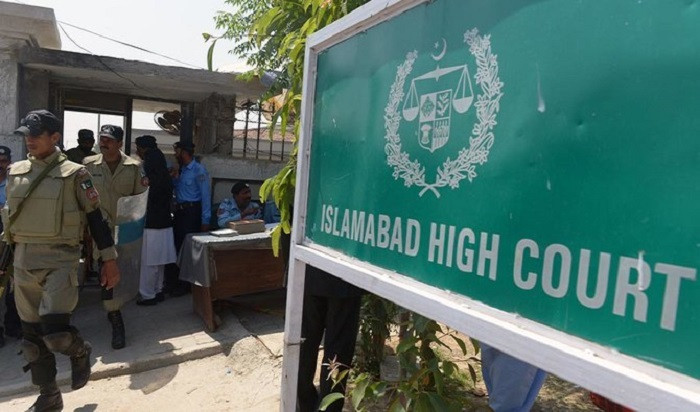
Despite the Islamabad High Court scrapping the government’s revised policy of granting land in the federal capital on subsidised rates to top judges, lawyers and bureaucrats, the Federal Government Employees Housing Authority (FGEHA) has offered membership to IHC judges for the allotment of plots in Sectors F-14 and F-15 of Islamabad under the quota reserved for the members of superior judiciary.
A three-judge special bench of the Supreme Court, led by Justice Munib Akhtar and comprising Justice Muhammad Ali Mazhar and Justice Ayesha Malik, was hearing the petitions filed by the FGEHA and others against the IHC judgment.
Interestingly, the bench has yet to suspend the IHC ruling.
The hearing of case has been adjourned until the end of the summer vacation.
Even though the matter is sub judice, the FGEHA wrote a letter to the IHC registrar last month wherein it was “requested that registration forms in respect of the Honourable Justices of [the] Islamabad High Court may kindly be submitted online at your convenience. The registration forms are available on the website of FGEHA.”
The letter stated that the allotment and quota policy for the scheme was approved by the executive committee of the erstwhile FGEHF [Federal Government Employees Housing Foundation] in its 142nd meeting.
It added that the members of the superior judiciary i.e. the SC, all high courts, including those of Azad Jammu and Kashmir and Gilgit-Baltistan, as well as Federal Shariat Court were found to be eligible for the allotment of plots in the scheme.
“In this connection, applications for registration were received from various worthy members of [the] superior judiciary, which were processed for allotments in Sectors F-14/15 [of] Islamabad. The aforementioned policy also entitles the Honourable Justices of the Islamabad High Court for registration,” the letter continued.
It further stated that the FGEHA had, however, received only two applications for registration from the judges of the IHC.
The letter also read that the FGEHA was mandated under the law to cater for the housing needs of federal government employees and other specified groups.
“For the said purpose, Phase-VII housing scheme i.e. Sectors F-14/15 Islamabad was launched and a membership Drive II was initiated,” it added.
In July 2021, the IHC registrar had informed the Pakistan Information Commission (PIC) that no sitting judge of the high court had applied for the allotment of a government plot.
Earlier, the IHC declared that superior court judges were not entitled to receive plots in a scheme launched by the FGEHA because no such privilege or entitlement had been included in the presidential orders.
“A person holding the office of a judge, whether in the Supreme Court, high court or even district court, enjoys a very exalted status. The expectation of the people from them is much more than from any other office holder. They are not federal government employees, nor employees of autonomous bodies. They cannot put themselves in a position of adversarial nature against the citizens. They hold an exalted office to serve the people,” read a 64-page judgment authored by then IHC chief justice Athar Minallah.
“The FGEHA and the federal government, by including the three categories as specified groups, have relegated them to the status of members for claiming benefits as per the decisions of the Executive Board. They have been treated as registered members of Membership Drive-II. The registered members of Membership Drive-I are at loggerheads and litigating for their rights and, resultantly, judges have also become a party to the litigation. The extraordinary treatment extended to the Supreme Court, Islamabad High Court and the District Courts of Islamabad as specified groups in itself raises questions,” the verdict read, scrapping the government’s revised policy on the allotment of plots in the federal capital.
The judgment also elaborated as to whether or not top courts judges were entitled to receive plots in a government scheme at lower prices.
The IHC in its ruling stated that neither civil servants or judges, nor employees of other entities could claim the allotment of government land at lower than the prevailing market price.
Several government servants, who were allotted plots, challenged the IHC judgment in the apex court through Advocate Hafiz Ahsaan Ahmad Khokhar.
The FGEHA also filed a petition against the high court verdict.
It will be interesting as whether or not the SC special bench will decide the matter before the retirement of Chief Justice of Pakistan Umar Ata Bandial.
It has been learnt that four serving SC judges and around a dozen retired ones were affected by the IHC judgment.
Despite the offer, the next CJP, Justice Qazi Faez Isa, refused to apply for a plot.
There are also a few other judges, who did not apply for the membership of the plots.
In October 2020, Justice Isa observed that neither the Constitution nor any law entitled judges or senior members of the armed forces to receive plots or pieces of land.
“It is trite, but needs restating that judges are not empowered to make law; they simply interpret it and if a law offends the Constitution they must strike it down,” observed Justice Isa in his additional note as the SC bench he was part of set aside the September 9, 2018 IHC judgment, which had scrapped the federal government’s housing scheme in Sectors F-14 and F-15 in Islamabad.
Justice Isa observed that both civil service and armed forces personnel were in the service of Pakistan and the Constitution created no distinction between them.
“The laws governing civil and armed forces personnel do not entitle them to receive residential plots, commercial plots or agricultural land. If lands are given to only one category like the members of the armed forces and the civilians in the service of Pakistan are disregarded, it constitutes discrimination and offends the fundamental right of equality,” he pointed out.
The judge observed that the amount to be spent in the financial year 2020-21 on pensions was Rs470 billion, of which Rs111 billion would be given to retired civilians and Rs359 billion to retired personnel of the armed forces.
The annual cost of pension payments was almost equal to the cost of ‘running of a civil government’ that was Rs476 billion and the people of Pakistan paid these pensions despite having very little themselves, he added.
“In addition to receiving pensions, public lands are taken which is eminently unfair,” Justice Isa regretted, adding that Pakistan was heavily indebted and the people paid astronomical amounts to service the accumulated debt.
“This financial year, Rs2 trillion will be paid to service debt; this astronomical amount does not include the repayment of a single dollar, sterling, yen, euro or rupee. And, the government continues to take more loans; piling debt upon debt, and adding billions to debt servicing,” Justice Isa noted, adding that the “elite capture” created a “predatory state” in which the division between private and public interests was totally dismantled.



1719660634-1/BeFunky-collage-nicole-(1)1719660634-1-165x106.webp)

1732276540-0/kim-(10)1732276540-0-165x106.webp)




1724249382-0/Untitled-(640-x-480-px)1724249382-0-270x192.webp)







COMMENTS (1)
Comments are moderated and generally will be posted if they are on-topic and not abusive.
For more information, please see our Comments FAQ